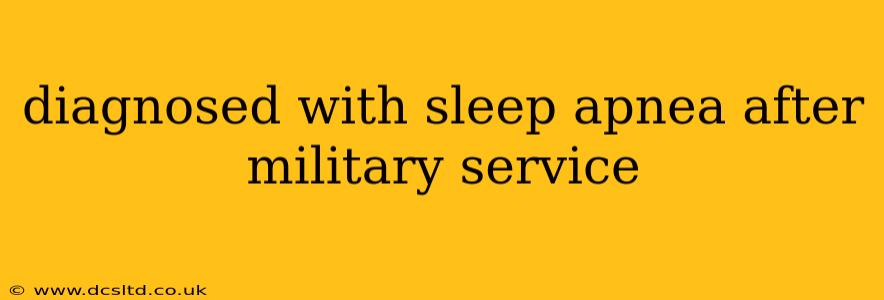Many veterans face unique health challenges after their service, and sleep apnea is unfortunately one of them. The rigorous demands of military life, exposure to traumatic events, and potential access to less-than-ideal healthcare can contribute to a higher incidence of sleep apnea among veterans. This comprehensive guide explores the link between military service and sleep apnea diagnosis, common symptoms, treatment options, and resources available to veterans.
What is Sleep Apnea?
Sleep apnea is a serious sleep disorder characterized by pauses in breathing or shallow breaths during sleep. These pauses can last from a few seconds to minutes and can occur repeatedly throughout the night, disrupting sleep and leading to a range of health problems. There are two main types:
- Obstructive Sleep Apnea (OSA): The most common type, where the airway becomes blocked during sleep, preventing air from reaching the lungs. This is often caused by soft tissue in the back of the throat collapsing.
- Central Sleep Apnea (CSA): A less common type where the brain doesn't send the proper signals to the muscles that control breathing.
How Military Service Might Contribute to Sleep Apnea
Several factors associated with military service can increase the risk of developing sleep apnea:
- Exposure to Loud Noises and Traumatic Events: Chronic exposure to loud noises and the psychological stress of combat or other traumatic experiences can contribute to sleep disturbances and potentially worsen existing sleep apnea. PTSD (Post-Traumatic Stress Disorder) is strongly linked to sleep problems.
- Shift Work and Irregular Sleep Schedules: Frequent deployments, irregular work schedules, and the constant need for alertness can disrupt the body's natural sleep-wake cycle, making one more susceptible to sleep apnea.
- Obesity and Physical Inactivity: The demanding physical nature of military life can, paradoxically, lead to unhealthy habits and weight gain in some individuals after service, which is a major risk factor for sleep apnea.
- Limited Access to Healthcare: While healthcare is often provided during active service, access to timely and comprehensive care may be limited after discharge, delaying diagnosis and treatment.
- Substance Use: Military personnel are at a higher risk of substance use, which can also exacerbate sleep apnea and other health conditions.
Common Symptoms of Sleep Apnea
Recognizing the symptoms of sleep apnea is crucial for seeking timely medical attention. Common symptoms include:
- Loud Snoring: Often accompanied by pauses in breathing.
- Daytime Sleepiness and Fatigue: Feeling excessively tired even after a full night's sleep.
- Morning Headaches: Waking up with headaches is often a sign of disrupted sleep.
- Difficulty Concentrating: Impaired cognitive function due to lack of restorative sleep.
- Irritability and Mood Swings: Sleep deprivation can significantly impact mood regulation.
- Nocturia (Frequent Urination at Night): Sleep disruptions can lead to increased urination.
Is Sleep Apnea Diagnosed Differently for Veterans?
The diagnostic process for sleep apnea is generally the same for veterans and civilians. However, veterans may require a more comprehensive assessment due to potential underlying conditions related to their service. A sleep study (polysomnography) is typically used to diagnose sleep apnea, measuring various physiological parameters during sleep to identify breathing disturbances and oxygen levels.
What Treatment Options are Available for Veterans with Sleep Apnea?
Treatment options for sleep apnea vary depending on the severity of the condition and may include:
- Continuous Positive Airway Pressure (CPAP): The most common treatment, using a machine to deliver a continuous stream of air pressure through a mask to keep the airway open during sleep.
- Oral Appliances: Custom-made mouthpieces that reposition the jaw and tongue to prevent airway obstruction.
- Surgery: In some cases, surgery may be necessary to correct anatomical issues contributing to sleep apnea.
- Lifestyle Changes: Weight loss, avoiding alcohol and sedatives before bed, and adopting healthy sleep habits are crucial components of treatment.
What Resources are Available to Veterans with Sleep Apnea?
The Department of Veterans Affairs (VA) provides comprehensive healthcare services, including diagnosis and treatment for sleep apnea. Veterans should contact their local VA healthcare facility to learn more about available resources and support. Additionally, many veteran support organizations offer guidance and assistance in navigating the healthcare system.
How Can I Get a Sleep Study as a Veteran?
To receive a sleep study through the VA, you'll need to contact your primary care physician or a specialist within the VA healthcare system. They will assess your symptoms and determine if a sleep study is necessary. Be prepared to discuss your symptoms, military history, and any relevant medical information.
What are the Long-Term Health Risks of Untreated Sleep Apnea?
Untreated sleep apnea can lead to serious long-term health complications, including:
- Cardiovascular Disease: Increased risk of heart attack, stroke, and high blood pressure.
- Type 2 Diabetes: Sleep apnea is associated with an increased risk of developing type 2 diabetes.
- Cognitive Impairment: Memory problems and difficulty concentrating.
- Depression and Anxiety: Sleep disturbances can worsen pre-existing mental health conditions.
- Motor Vehicle Accidents: Excessive daytime sleepiness increases the risk of accidents.
This information is intended for educational purposes only and should not be considered medical advice. If you suspect you have sleep apnea, consult with a healthcare professional for proper diagnosis and treatment. Veterans should actively engage with the VA healthcare system to access the support and resources available to them.
